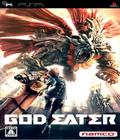Monster Hunter is perhaps the most successful game on the PSP. It may not have the star power of a Final Fantasy or God of War title, but it holds a strange addictive quality that few other games can match. In Japan, it is the only game that can consistently compete with Nintendo's juggernaut, and even overseas, the various Monster Hunter titles remain some of the most popular on the PSP. Capcom has even started to add elements of Monster Hunter to some of its other franchises, like the upcoming Lost Planet 2, which looks to put Monster Hunter mechanics in an action-shooter setting. Perhaps the only real surprise is that it has taken this long for a real competitor to appear. There's no doubt that God Eater is a Monster Hunter clone, but what makes it interesting is that it may also be a true competitor!
God Eater is set in the not-so-distant future in which the world has been utterly decimated. Sometime in the past 20 years, a group of demonic creatures appeared on Earth. Called the Aragami, or roughly translated "Raging Gods," these creatures killed most of the planet's population in an extremely short period of time. The only reason any humans survived at all was because of the Fenrir Corporation, a pharmaceutical company that harnesses "Origin Physics" to create bio-organic weapons called Jinki. These weapons were fused with humans, granting them massively improved strength and speed, and the ability to kill Aragami. Known as "God Eaters," the humans who have been partnered with the bioweapons are now the only ones capable of repelling the Aragami invasion and saving humanity.
God Eater is unavoidably going to be compared to Monster Hunter, and for good reason. The games share a lot of similarities, and God Hunter is a clear attempt to offer up a competitor to Capcom's goliath. Like Monster Hunter, you play as a regular human armed with ridiculous weapons sent to hunt down terrible creatures. In this case, it would be the Aragami, who take the form of gigantic demons and monsters. You work for the Fenrir Corporation, and the basic flow of the game is straightforward. Fenrir issues you a mission to hunt down and kill rogue Aragami, and if you succeed, you're rewarded with prizes and gifts based on how quickly and efficiently you slay the Aragami. It's a straightforward kind of game, although there are enough twists and turns to keep things fresh despite the simple premise.
Your primary weapon in God Eater is the Jinki that is attached to the character's arm. The bio-organic weapon can mimic shapes of various objects in order to be used in combat. By default, you have two combat modes: Blade mode and Gun mode. Blade mode transforms the Jinki into a close-range combat weapon. Depending on your weapon, you can perform different combos by pressing the Triangle and Square buttons, allowing you to unleash massive hurt on Aragami from a close range. You're also rather agile in Blade mode and can perform dashes and jumps to avoid enemy attacks. While you're fighting in Blade mode, your attacks use up your stamina. You can slash wildly, but it's a bit risky, as running out of stamina also prevents you from jumping or dashing. This can leave you extremely vulnerable if an Aragami wants to munch on your face. Blades come in all sorts of shapes and sizes, ranging from regular-sized swords to hilariously oversized great swords that dwarf your character. You can also press the R and Circle buttons at the same time to transform into Shield mode, which reduces the damage you take from attacks while active.
In addition to Blade mode, you also have access to Gun mode, in which your Jinki turns into a ranged weapon. Your Jinki in Gun mode can either be fired normally or manually targeted by going into an aiming mode and using the d-pad to target your foes. It's certainly slower than your blade but gives you the benefit of distance from your foe. Your dashing ability also turns into a dodge roll, which is a bit slower but better for dodging long-distance attacks. Guns, unlike swords, use different kinds of ammunition. You can fire different type of shots, like explosive rounds or laser beams, and use different elemental effects with those shots, all by switching your ammo. However, you can only use your gun as long as you have Origin Physics, or OP. Each shot takes some of your OP meter, and once your meter is dry, you're unable to fire any more shots, and OP doesn't regenerate naturally.
Keeping your OP filled is where the third Jinki mode, Predator mode, comes into play. Unlike the first two modes, Predator mode isn't one you can select; it functions sort of like a special attack that can be performed when you're in Blade mode. Holding the Triangle button for a few moments will cause your blade to transform into a horrible fanged maw. Once the transformation is complete, you can release the button to make your Jinki take a bite out of any nearby Aragami. This is, of course, the titular god-eating. Taking a bite out of enemies in Predator mode has a wide range of effects, all of which are beneficial. First and foremost, it restores your OP. If you want to keep using Gun mode, you'll want to be nomming on Aragami at every chance. Secondly, it puts your character into Concentration mode, which makes your character's blade attacks stronger, and he is significantly faster. You can also perform double jumps, and even a special charging attack with your weapon. A successful Predator attack also gives you a special kind of ammunition for your Gun mode. This ammunition can only be used once but packs a much heavier punch than anything you can access normally. Finally, any successful bite in Predator mode will also give you items. As you can imagine, you'd want to use Predator mode at every chance, but it does come at a cost. Predator mode is very slow to charge up, and if you use it poorly, you're a sitting duck for Aragami. In order to use it properly, you have to wait for a break in the enemy's defenses and exploit it. You can also use the Predator mode on a dead Aragami, although to lesser effect.
Item hunting is going to be an important part of your God Eater experience, so you should be using Predator mode at every chance. You begin with a default Jinki and armor, but that isn't going to be enough to last you. Even in the demo, your regular gear quickly becomes outdated. In order to upgrade your equipment, you're going to need material gathered from Aragami to craft new weapons. While it's possible to buy items from the in-game store or receive them as prizes from missions, the primary way to get them is through god-eating. The rare materials necessary to make the best equipment only seem to come from god-eating, although this may change outside of the scope of the preview build. Although it wasn't available in our build, God Eater will also allow you to trade items with other players, allowing friends to gather material with greater ease.
God Eater is clearly a heavily multiplayer-oriented game. In the single-player mode, you'll have access to a group of computer-controlled AI characters who can join you on missions. From what I've seen, these guys handled pretty well, but it was clear that they were no replacement for actual humans. Like Monster Hunter, God Eater clearly assumes that you're going to be bringing some friends along for the ride, and most of the missions are going to be far easier with another human at your side. Up to four players can go into missions together through the wonders of wireless. While no mission in the preview build looked to be impossible without help, there were a few that were clearly designed to be played with friends along for the ride, and they were made much harder by the absence of humans.
Visually, God Eater is a fairly impressive game. You begin by creating your own customized character, and there are a lot of options for clothing, hairstyle and facial features to be found. The real stunning element, however, is the game's levels. They're surprisingly haunting and interesting areas, set in the burned-out ruined of the world's cities, and a lot of effort was clearly put into making it feel like a postapocalyptic hellhole. The Aragami come in all shapes and sizes, some of which are four-legged demons or lion-like monstrosities. Our preview build only gave us a brief glimpse into the world of God Eater, so it is still unclear how large and deadly the Aragami will get. Considering that they're planning to compete with Monster Hunter, however, it's a safe bet that the Aragami won't stay "small" for long.
God Eater is an interesting attempt to compete with Monster Hunter. The basic mechanics are not too different from Capcom's popular hit, but there are enough differences to make it stand out. The Jinki is a unique weapon, and being able to switch from Blade to Gun to Predator modes will give combat a unique flowing approach to distinguish it from Monster Hunter. On the surface, it's impossible to deny that this is a Monster Hunter clone, but it has the potential to offer something to those who have grown tired of the original or are simply looking for something that Capcom's title didn't offer. As of this writing, God Eater has not been announced for release outside of Japan, but considering the success of titles like Monster Hunter on the PSP, it's highly likely that America and European gamers will see it at some point.
More articles about God Eater











 In God Eater, the earth has been ruined by mutated beasts known as the Aragami and mankind’s only hope against them is the Jinki weapons and the God Eaters who wield them. Players will create their own hero and battle more than 35 unique enemy types to find items to customize their weapons, guns, bullets and shields to increase their strength and stamina.
In God Eater, the earth has been ruined by mutated beasts known as the Aragami and mankind’s only hope against them is the Jinki weapons and the God Eaters who wield them. Players will create their own hero and battle more than 35 unique enemy types to find items to customize their weapons, guns, bullets and shields to increase their strength and stamina.


































